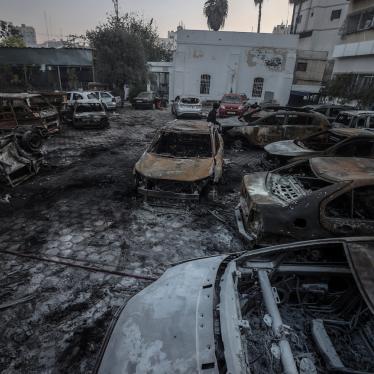The Uzbek government has blocked international observers from monitoring two trials related to the May 13 events in Andijan, Human Rights Watch said today. Human Rights Watch called on the government to uphold fair trial standards, including the right to a public hearing, by allowing trial monitors into the courtroom.
“The Uzbek government’s attempt to cover up the truth about Andijan now extends into the courtroom itself,” said Holly Cartner, Europe and Central Asia director at Human Rights Watch. “The government says it is conducting fair and open trials, but in fact is withholding all information about the proceedings and denying access to observers.”
At least two trials related to the Andijan events are underway in cities near Tashkent, with unconfirmed reports that others are also taking place. The police guarding the courthouses denied Human Rights Watch access to both of the known trials.
One of those trials, of at least 15 defendants, is taking place in the Orta Chirchik (Center Chirchik) district court in Toitepa. According to local residents of the town, the trial has been underway for three or four days. When a Human Rights Watch representative arrived in Toitepa on November 28, the road to the court was blocked and the courthouse was guarded by three soldiers. The Human Rights Watch representative observed as a bus and two trucks arrived at the courthouse. Approximately 15 soldiers and one dog jumped out of the bus. The policemen took 15 men, apparently the defendants, one by one from the trucks into the courthouse. The men had their hands bound behind their backs, and the policemen held them by their necks, forcing their heads and torsos down. Fifteen minutes later a bus arrived with people believed to be the defense lawyers; they were accompanied by unidentified people in plain clothes. At least one of the lawyers had also participated in the recent Supreme Court trial related to the Andijan events.
A second trial is ongoing in the Yurqora Chirchik (Upper Chirchik) district court in Yangibazar. On November 29, a Human Rights Watch representative tried to attend the trial and was also denied access.
Policemen outside the Orta Chirchik demanded that Human Rights Watch obtain written permission from the Supreme Court to monitor the trials. When Human Rights Watch attempted to get permission from the Supreme Court, a person in the secretariat of the chairman of the Supreme Court who did not identify himself on the telephone told Human Rights Watch to write a letter to the head of the respective district court. According to him, the Supreme Court is not in charge of trial monitoring.
The Supreme Court and the police outside the courthouses refused to reveal the names of the defendants, lawyers and judges as well as any information regarding the charges against these defendants or information about other trials related to Andijan that may be underway.
“The Uzbek government should allow immediate access to the trials for defendants’ relatives, trial monitors and local human rights activists,” said Cartner.
According to Uzbek legislation, every trial is considered open unless declared closed by the judge for reasons such as the protection of national security or the interests of minors.
On November 14, the Uzbek Supreme Court handed down a guilty verdict for all 15 defendants in the first Andijan-related trial. Human Rights Watch had serious concerns. that the trial did not comply with international fair-trial standards. According to official reports, more than 100 people were detained and charged in relation to the Andijan events and are currently awaiting trial.






